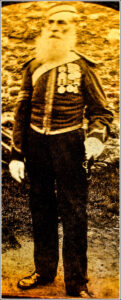November 17th 1876
– It is a common saying that “one half of the world does not know how the other half lives,” and we strongly suspect that considerably more than one half cares as little as it knows. This after all is, perhaps, just what might be expected. Both society, and the individual members composing it, must fight their own battles, and they are all the better for doing so. Indeed, the surest and the speediest way to spoil a hero or a genius is to make a demigod of him, and to set all the asses in the district braying around him. Robert Burns was never less of a man than after he had been feasted and feted by the elite of Edinburgh. It was then that he had to take the shady side of the street in Dumfries, and suffer all the miseries of blighted and blasted hopes at the close of “lifes fitful fever.” We have had for some years a hero in our midst, in the person of Sergeant John Penn, whose name will be held in honour as long as the famous charge of the “Six Hundred” stirs the manly heart of the British nation. In an appreciative article, in connection with the recent anniversary of the Battle of Balaclava, the United Service Gazette bewails the little sympathy which is bestowed upon those who have fought our battles after the hard and thankless work has been done. “The charge of the ‘Six Hundred’ ” says our contemporary, “as a feat of manhood and military prowess, far surpasses the defence of Thermoplyae. Such men as Jack Penn, the possessor of the greatest number of medals in the British Army, and Roberts of Wednesbury, who was picked up on the field wounded in eight places, were not the company of which any man, however high his social position, need be ashamed.” The fact is also alluded to that “such heroes as assembled round the table at the banquet still remained non-commisioned officers or privates.” “They manage these things better in France,” where, by this time, every one of these men would have held the rank of commisioned officers – and, perhaps, one of them would have possessed the distinction of a Marshal’s baton. We have no wish at present, at least, to imitate Charles Reade, and make “a hero and a martyr” of Sergeant John Penn. His modesty is as great as his heroism: and, perhaps, both may yet be more fully appreciated than they are at present. Respectability, which keeps its gig, and drives past Sergeant Penn, should remember that his name is among “the immortals,” and will be held in honour so long as there is a brave heart and a strong arm to fight for our Queen and country. Sergeant Penn, we may add, is at present acting as compulsory officer to the Dunbar (Landward) School Board, and there is little doubt that, with his strong sense of duty, he will charge down upon the absentees from school as earnestly and as manfully as he did upon the Russians, when
“Into the valley of Death
Rode the Six Hundred.”
February 5th 1886
Deaths
At 41 High Street, Dunbar, on the 31st ult., Sergeant JOHN PENN, late 17th Lancers and E.L.Y.C. (one of the Six Hundred).
August 22nd 1890
THE LATE SERGT. JOHN PENN.-A handsome Ionian cross has been erected in the churchyard to the memory of this gallant soldier. To the Earl of Haddington belongs the credit of initiating the monument, and the subscribers included Major Robert Baillie Hamilton; the late sir Hew Dalrymple, Bart; Colonel Anderson of Bourhouse; Capt. Baird Hay of Belton; Mr Hunter of Thurston, &c., The cross bears the following inscription:-
JOHN PENN
Late Sergeant
E.L. & B. Yeo.Cav.
A BRAVE SOLDIER:
Served with 3rd Light Dragoons
In India at
Moodkee, Sabraon, Goudalapore, Chillianwalla, Goojerat;
With 17th Lancers In the Crimea at
Alma, Balaclava, Inkerman.
Born 31st Dec. 1820.
Died 31st Jan. 1886 .


